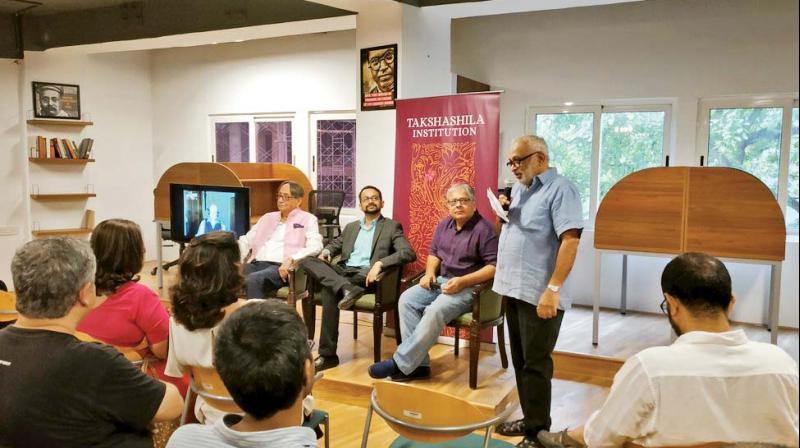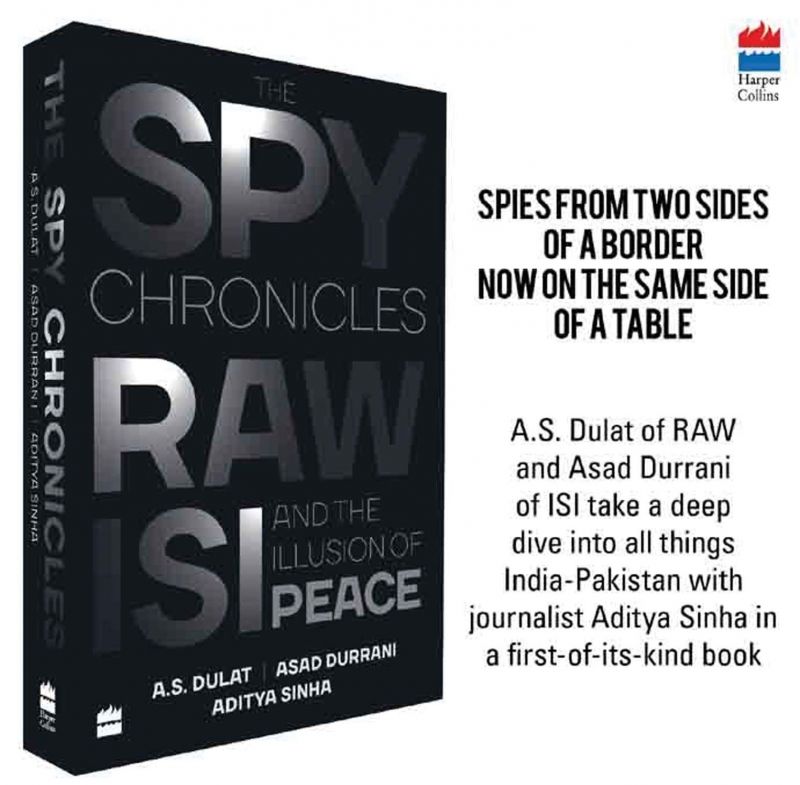Chronicles from the LOC

The term ‘deep state’ arose rather often, which is, perhaps, not altogether too surprising when the man engaged in conversation is former R&AW Chief, Amardeep Singh Dulat. Intrigue is a matter of course in the world of elite espionage, but the former chiefs of two of the world’s most elite intelligence agencies sitting down to swap stories has raised many an eyebrow, even amongst their own circles. There was even some caterwauling from a former R&AW Chief at the book launch in Delhi, who shook his fist and proclaimed that an operation had been disclosed. Either way, Spy Chronicles, a series of conversations between A.S. Dulat and former ISI Chief, Gen. Asad Durrani, is the stuff of history. Only two-thirds of the contributors made it to the event at Bangalore International Centre: the writer, Aditya Sinha and A.S. Dulat. General Durrani, who still hasn’t managed to launch the book alongside his counterparts, had promised to make an on-screen appearance the next day.
The idea of Pakistan inviting National Security Adviser Ajit Doval to initiate a dialogue found favour amongst Dulat’s audience here in Bengaluru. In the end, it was decided, unanimously, that there could be no better envoy of peace than A.S. Dulat himself.
“I grew to like him,” Dulat says of General Durrani. “He calls a spade a spade.” It does give credence to another view they put forth, the Pakistan-India relationship is a war of strategy and politics. A member of the audience asked if General Durrani’s famed rigging of elections marred Dulat’s opinion of him, but the relationship, we could come to learn, was far more complex than the immediate purview of their professions. Outside of office, both these men discovered a great deal of common ground and when contention arose, were happy to let it slide without much further ado.
Dulat, whose connections to Kashmir go back over three decades, since his time in Srinagar as the special director of the Intelligence Bureau.
The historic Agra Summit was held in July 2001, six months after he assumed his position in the Office of Prime Minister Vajpayee. It was then that Vajpayee, stressing the economic betterment of Kashmir, invited a dialogue with the All India Parties Hurriyat Conference. “I don’t know what happened at Agra, other than the fact that Brijesh Mishra (then NSA), came back a very disappointed man. Perhaps it was a tactical error, they put all their eggs in the Vajpayee basket. Either way, the situation in Kashmir is worse now than it has ever been.”

A MESS OF OUR OWN MAKING
The swearing-in ceremony of the BJP-PDP coalition in 2014 in Kashmir, saw even Prime Minister Narendra Modi in attendance. As Dulat recalled, having been present, the atmosphere was one of great bonhomie and celebration. That is, until, the Prime Minister and his BJP entourage had taken their leave. “At that point, Mufti was in his element, calling a press conference and thanking Pakistan and the Hurriyats for a good election.” The coalition, he admits, was always going to be a difficult one but the writing was always on the wall.
The situation in Kashmir, Dulat declares, is worse now than it has ever been. “It’s a big, big mess and I’m sorry to say that much of it is of our own creation.” There have been many watershed moments for the Kashmirirs, they’re always at some crossroads. Now, he says, the BJP-PDP coalition is at the heart of the trouble. “The result of the 2014 election was such that nobody was satisfied with the result,” he said.
THE DOOMED COALITION
Spy Chronicles was two and a half years in the making and through it all, Dulat simply couldn’t shake the feeling that the tremulous BJP-PDP coalition in Kashmir wouldn’t last much longer. Mere weeks had passed since Spy Chronicles hit the stand, when the government collapsed. “I did think Mehbooba Mufti would be the one to witdhraw. But the BJP was smarter, really. they didn’t give her that opportunity. People think that governor’s rule isn’t a bad idea for the moment but the earlier you ahve elections, the better.”
MESSENGERS OF PEACE
When Mr Dulat ventured to General Durrani thaht he might be the ideal interlocutor for Kashmir, he found his idea dismissed. Mr Dulat does, however, stand by his opinion of Farooq Abdullah as Kashmir’s tallest leader. “Many people think he is frivolous, but no. He not only knows Kashmir, he also understands Delhi better than anyone else. Even better than Mufti sahib did.”
MUSHARAFF, THE MAN OF REASON
General Musharaff, Dulat remarks, was “the most reasonable of all Pakistani leaders. He believed that the solution lies on the Line of Control. I would like to ask him if he regrets the collapse of the Agra Summit. It was a great window of opportunity for us. In 2006-7, we looked back and thought, ‘If only Musharaff was there’! But it was too late.”
INDIA AS A POLITICAL TOOL
“Most of the Pakistani army officers I have met are not against the idea of an India Pakistan relationship,” Dulat said. While the nature of that relationship might be up for dispute, even General Durrani agrees that this might be the best we can achieve. “He calls it a stable stalemate, saying status quo is good enough.” The degrees of understanding between India and Pakistan are often belied by the latter’s need for a political tool, for the army to justify its actions.

